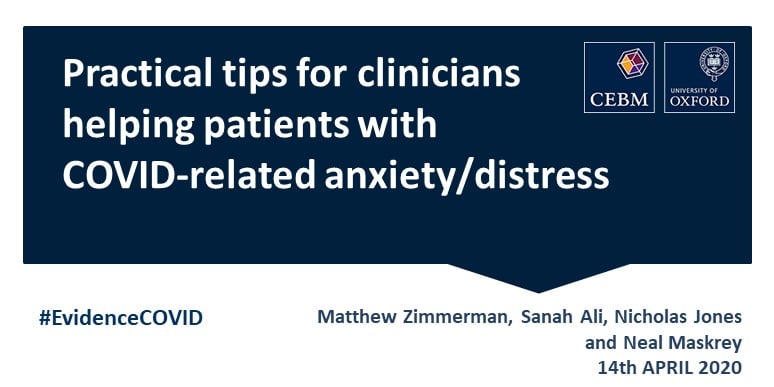Practical tips for clinicians helping patients with COVID-related anxiety/distress
April 14, 2020

Matthew Zimmerman, Sanah Ali, Nicholas Jones and Neal Maskrey
On behalf of the Oxford COVID-19 Evidence Service Team
Centre for Evidence-Based Medicine, Nuffield Department of Primary Care Health Sciences
University of Oxford
Neal Maskrey is Honorary Professor of Evidence-informed decision making, Keele University
Correspondence to nealmaskrey@gmail.com
VERDICT
The key recommendations from current guidance and research for healthcare workers supporting patients with COVID-related anxiety include:
- Regulating exposure to COVID-related media.
- Maintaining a strong social network.
- Looking after your body and avoiding unhealthy coping strategies.
- Focusing on self-care techniques including mindfulness.
BACKGROUND
Prospective longitudinal studies have demonstrated that heightened stress responses during and in the aftermath of a threatening event are associated with adverse physical and mental health.1 A recent cross-sectional study involving 7,263 self-selected volunteers in China during the COVID epidemic found the overall prevalence of generalised anxiety disorder, depressive symptoms and poor sleep quality were 35.1%, 20.1%, and 18.2% respectively,2 although this is a pre-print and not peer-reviewed paper. Healthcare workers are under particular stress given the pressure the pandemic is placing on resources, combined with fears of transmitting infections at work to family members at home and concerns over inadequate personal protective equipment.
The objective of this rapid review was to identify the best available current evidence to support clinicians in responding to COVID-related anxiety.
CURRENT EVIDENCE
We identified 6 recently published national or international documents providing information and recommendations relating to stress, mental health or anxiety associated with COVID-19. None of the documents described the levels of evidence underpinning their recommendations. Given the timescale of the COVID-19 pandemic it seems reasonable to assume that most recommendations are based on expert consensus.
Recommendations for preventing or managing COVID-19 anxiety
Media Exposure
Six documents recommend limiting exposure to worrying or distressing media stories and only using trusted sources to look at facts,3-8
Community
Six documents recommend connecting with friends and family online,3-8 and three recommend helping and supporting others in the community.4,5,8
Self-Care
Three documents recommend practising meditation and/or mindfulness,3,4,7 five recommend looking after your body (healthy eating, good sleep hygiene and regular exercise),3-6,8 five recommend avoiding unhealthy coping strategies such as alcohol/ tobacco/ recreational drugs,3-6,8 and three recommend doing things you enjoy.3,4,8
| Specific guidance |
Number of documents recommending the approach |
| Minimise the amount media exposure |
63-8 |
| Use trusted sources to access information about the COVID-19 pandemic |
63-8 |
| Connect with friends and family online and via telephone |
63-8 |
| Help and support others in the community |
34,5,8 |
| Practise meditation and mindfulness |
33,4,7 |
| Look after your body: eat healthily/ implement sleep hygiene advice/ exercise regularly |
53-6,8 |
| Avoid unhealthy coping strategies, such as alcohol, smoking tobacco and taking drugs |
53-6,8 |
| Do activities you enjoy |
33,4,8 |
If anxiety symptoms are persistent or severe and impair a person’s own life or the lives of those around them, it may be necessary to consider treatment options, such as those recommended by the National Institute for Health and Care Excellence (NICE) in the United Kingdom for generalised anxiety disorder and panic disorder9, obsessive compulsive disorder10, or social anxiety disorder11.
Recommendations to reduce the mental health impact of COVID-19 in health care workers from the World Health Organisation include:5
- Ensuring good communication within and between teams.
- Rotating teams between higher-stress and lower-stress settings where possible.
- Partnering inexperienced workers with experienced workers in a buddy system.
- Ensuring adequate breaks where possible.
- Providing flexible schedules where possible.
- Creating opportunities for mutual support.
- Signposting to mental health support services.
EMERGING EVIDENCE IN COVID-19
We found one paper that looked at the usefulness of daily mindfulness practice.12 Zheng et al randomly assigned 97 adults to either daily mindfulness or daily mind-wandering practice during the COVID-19 outbreak in Wuhan. The participants in the mindfulness group completed a self-guided daily mindfulness practice, whereas the mind-wandering group listened to audio recordings, which were designed to un-focus attention and elicit a ‘baseline wakeful state’. Among the group who practised daily mindfulness, daily anxiety was significantly lower and an increase in infections in the local community had significantly less impact on their sleep duration. The authors concluded that online mindfulness groups should be recommended and made available to all during the COVID-19 outbreak.
A study by Xiao et al13 concluded that individuals with a wider and more reliable social circle coped better during a 14-day quarantine in Wuhan during the COVID-19 outbreak in January 2020. They identified 170 individuals who isolated at home, and asked participants to complete questionnaires to assess social capital, anxiety, stress and sleep quality. It was found that individuals with greater social support reported lower levels of stress and anxiety and improved sleep quality, compared to those who had less access to social support. They recommended widening one’s social network and using social support, in order to reduce negative emotions.
Xiao et al also found in a cross-sectional study (n=180) in China in January and February 2020 that the level of social support available to individual medical staff who treated COVID-19 patients was positively associated with improved sleep and self-efficacy.14
There is some evidence that certain behaviours can decrease psychological impact.15 Wang et al received responses from 1,304 respondents in a survey that assessed the psychological impact of the COVID-19 outbreak and mental health status. Linear regression analysis showed that specific precautionary behaviours (e.g. hand washing) and the provision of up-to-date specific and accurate health information were associated with a lower psychological impact.
Limitations of recent COVID-19 evidence for preventing or managing anxiety:
- It may be difficult to generalise findings from recent studies due to the small number of studies, small sample sizes, short observation periods, pre-print data and results coming from a single geographical region.
- Most studies used observational designs and subjective methods of reporting data.
- There is a particularly high risk of selection bias in most of the studies.
CONCLUSIONS
We found limited direct evidence that following recommendations in current guidance during and after the COVID-19 pandemic results in better mental health outcomes. However, it seems unlikely that such recommendations, if employed judiciously on an individualised basis, would cause harms. Future studies are underway, which will provide additional evidence in the coming weeks, such as a survey at University College London into the psychological and social effects of COVID-19 (https://www.ucl.ac.uk/news/2020/mar/new-study-psychological-and-social-effects-covid-19).
Clinicians advising patients with COVID-related anxiety or distress should discuss the following options:
- Media exposure:
- Limit your exposure to media reporting on the COVID-19 pandemic
- Use trusted resources to access information about COVID-19, such as GOV.UK, Public Health England and NHS England websites
- Connecting with community:
- Connect with family and friends via telephone or on the internet
- Support others in the community, in accordance with guidance on COVID-19
- Self-help techniques:
- Practise meditation and mindfulness techniques
- Look after your physical health: eat healthily, sleep well, exercise regularly
Clinicians should refer to specific recommendations within the referenced guidance relevant for certain groups, such as people with pre-existing mental health conditions, people with learning disabilities, the elderly, patients with high-risk medical conditions, and children.
End.
Disclaimer: the article has not been peer-reviewed; it should not replace individual clinical judgement and the sources cited should be checked. The views expressed in this commentary represent the views of the authors and not necessarily those of the host institution, the NHS, the NIHR, or the Department of Health and Social Care. The views are not a substitute for professional medical advice.
AUTHORS
Matthew Zimmerman is a 5th Year Medical Student at the University of Oxford.
Sanah Ali is a 5th Year Medical Student at the University of Oxford.
Dr Nicholas Jones is a Wellcome Trust Doctoral Research Fellow at the University of Oxford.
Professor Neal Maskrey was a general practitioner in Yorkshire for 20 years. He worked for North Yorkshire Health Authority developing primary care, was an early editor of Clinical Evidence (BMJ Publications), and then spent 14 years as a director of the National Prescribing Centre and Programme Director of the Medicines and Prescribing Centre at NICE. He is now Visiting Professor of Evidence-informed decision making at Keele University and his current work includes developing and evaluating programmes to support shared decision making in consultations, developing patient decision aids for NHS England, and in improving self-awareness of the processes of decision making by both health care professionals and patients.
SEARCH TERMS
Comprehensive literature searches addressing the research question were developed by an experienced librarian for PsycINFO, EMBASE, Medline, PubMed and CINAHIL, AMED, BNI, EMCARE and HMIC databases. Search terms included key word terms: pandemics, anxiety, pandemic flu, pandemic H1N1 2009 influenza, pandemic human influenza, pandemic influenza, anxiety, covid*, health anxiety, distress, cop*, tip*, strateg*, deal*, psych*, mental health).
REFERENCES
- Garfin, D., Silver, R. and Holman, E., 2020. The novel coronavirus (COVID-2019) outbreak: Amplification of public health consequences by media exposure. Health Psychology, [online] Available at: <https://psycnet.apa.org/fulltext/2020-20168-001.html>
- Huang, Y. and Zhao, N., 2020. Generalized anxiety disorder, depressive symptoms and sleep quality during COVID-19 epidemic in China: a web-based cross-sectional survey.
- Centers for Disease Control and Prevention. 2020. Coronavirus Disease 2019 (COVID-19): Stress And Coping. [online] Available at: <https://www.cdc.gov/coronavirus/2019-ncov/daily-life-coping/managing-stress-anxiety.html?CDC_AA_refVal=https%3A%2F%2Fwww.cdc.gov%2Fcoronavirus%2F2019-ncov%2Fprepare%2Fmanaging-stress-anxiety.html#responders> [Accessed 1 April 2020].
- UK. 2020. COVID-19: Guidance For The Public On Mental Health And Wellbeing. [online] Available at: <https://www.gov.uk/government/publications/covid-19-guidance-for-the-public-on-mental-health-and-wellbeing> [Accessed 1 April 2020].
- Mental Health And Psychosocial Considerations During The COVID-19 Outbreak. [online] Available at: <https://www.who.int/docs/default-source/coronaviruse/mental-health-considerations.pdf?sfvrsn=6d3578af_10> [Accessed 1 April 2020].
- RC PSYCH ROYAL COLLEGE OF PSYCHIATRISTS. 2020. COVID-19 And Mental Health. [online] Available at: <https://www.rcpsych.ac.uk/about-us/responding-to-covid-19/covid-19-and-mental-health> [Accessed 1 April 2020].
- Mental Health Foundation. 2020. Looking After Your Mental Health During The Coronavirus Outbreak. [online] Available at: <https://www.mentalhealth.org.uk/publications/looking-after-your-mental-health-during-coronavirus-outbreak> [Accessed 1 April 2020].
- uk. 2020. Every Mind Matters | One You. [online] Available at: <https://www.nhs.uk/oneyou/every-mind-matters/coronavirus-covid-19-anxiety-tips/> [Accessed 1 April 2020]..
- org.uk. 2020. Key Priorities For Implementation | Generalised Anxiety Disorder And Panic Disorder In Adults: Management | Guidance | NICE. [online] Available at: <https://www.nice.org.uk/guidance/cg113/chapter/Key-priorities-for-implementation> [Accessed 8 April 2020].
- org.uk. 2020. Overview | Obsessive-Compulsive Disorder And Body Dysmorphic Disorder: Treatment | Guidance | NICE. [online] Available at: <https://www.nice.org.uk/guidance/cg31> [Accessed 10 April 2020].
- org.uk. 2020. Overview | Social Anxiety Disorder: Recognition, Assessment And Treatment | Guidance | NICE. [online] Available at: <https://www.nice.org.uk/guidance/cg159> [Accessed 10 April 2020].
- Zheng, M., Yao, J. and Narayanan, J., 2020. Mindfulness Buffers the Impact of COVID-19 Outbreak Information on Sleep Duration. Pre-print published 20 March 2020. DOI 31234/osf.io/wuh94
- Xiao, H., Zhang, Y., Kong, D., Li, S. and Yang, N., 2020. Social Capital and Sleep Quality in Individuals Who Self-Isolated for 14 Days During the Coronavirus Disease 2019 (COVID-19) Outbreak in January 2020 in China. Medical Science Monitor, [online] 26. Available at: <https://repository.publisso.de/resource/frl:6419384/data>.
- Xiao H, Zhang Y, Kong D, Li S, Yang N., 2020. The Effects of Social Support on Sleep Quality of Medical Staff Treating Patients with Coronavirus Disease 2019 (COVID-19) in January and February 2020 in China. Med Sci Monit.
- Wang, C., Pan, R., Wan, X., Tan, Y., Xu, L., Ho, C. and Ho, R., 2020. Immediate Psychological Responses and Associated Factors during the Initial Stage of the 2019 Coronavirus Disease (COVID-19) Epidemic among the General Population in China. International Journal of Environmental Research and Public Health, 17(5), p.1729.

